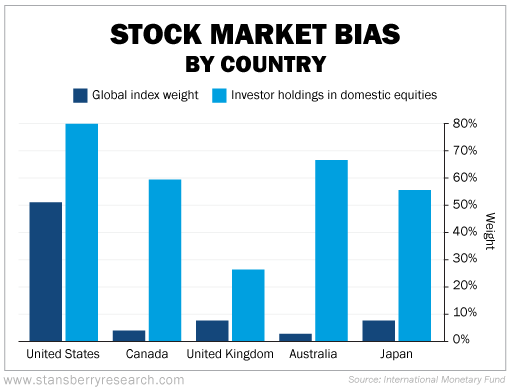Doc's note: Many of the best companies in the world are based in the United States. But if your portfolio is stuffed with American companies, you may be in a dangerous position... far more so than you realize.
That's why today, I'm sharing an essay from my good friend and colleague Steve Sjuggerud. He explains how that hurts your portfolio and details a country you should consider adding to your portfolio today...
Let's play a game...
I'll say something, and you raise your hand if it's true for you.
I'm serious. Don't raise a "mental hand." You need to actually pick your arm up. That's the rule, so play along.
First up...
"I live in the U.S."
A decent chunk of non-U.S. readers follow my work, but 80% to 90% of those reading just picked up their hands. By and large, my DailyWealth readers are from the U.S.
OK, next up...
"I own U.S. stocks."
Just about everyone is raising their hands now. Even those outside the U.S. tend to own stocks from the world's largest and most important market. And those in the U.S. are undoubtedly invested in their own country. Why wouldn't they be?
Here's where things get tricky, though. This one's just for U.S. folks...
"More than 70% of my stock portfolio is invested in the U.S."
Did you raise your hand? I bet you did. But here's the thing... In a perfect world, no one raises their hand to that question.
Don't feel bad if you did. Most U.S. investors are in the same boat. But you should know, this common mistake is actually a big problem.
Let me explain...
Investors have a bad habit of making this critical error, called "home-country bias." It's what causes investors to leave entirely too much of their money wrapped up in the country they're from.
It's normal, of course... If you're from the U.S., then you understand the U.S. You see it and live in it every day.
You don't experience China or Australia or Brazil on a daily basis. You don't understand the markets in those countries. But still, ignoring them with your investment dollars can be a big mistake.
The U.S. stock market might be the world's largest and most important, but it only makes up around half of the world's market cap. If you only own U.S. investments, you're ignoring half of global stock markets! You're missing half of the world's opportunities!
If you're from the U.S. and you're not succumbing to home-country bias, then only half of your portfolio should be in the U.S. But believe me, few folks actually meet that standard.
Just take a look at the chart below. It shows what percent of the global stock market a handful of countries make up, alongside how much a typical person invests in their home market...

Again, U.S. investors should have around 50% of their stock investments in the U.S. But most folks are closer to 80%. And the problem is likely much worse if you're a foreign investor...
Canadian stocks make up just 3.4% of global market cap. But the typical Canadian has 59% of their investments in Canada. The story is similar in the other countries listed, and likely in most countries around the globe.
Sure, the U.S. has been a major winner over the last decade. So if you live in the U.S., giving in to home-country bias has probably worked out for your portfolio in recent years. But there's no guarantee it will work forever.
That's why I've urged readers to look at investments outside the U.S. Specifically, I've been pounding the table about the opportunity in China.
You don't have to take me up on that idea. But if your entire portfolio is invested in your home country, it's time to diversify some of your investments. If you don't, you could end up paying for your home-country bias.
Good investing,
Steve
P.S. What's happening in Hong Kong is only part of the story. There's a flood of money heading for Chinese stocks on November 27. We're talking tens of billions of dollars... And you have the opportunity to get your money there first. I recently put together a presentation outlining exactly what's going on. It goes offline at midnight tonight – so I urge you to check it out right here.

